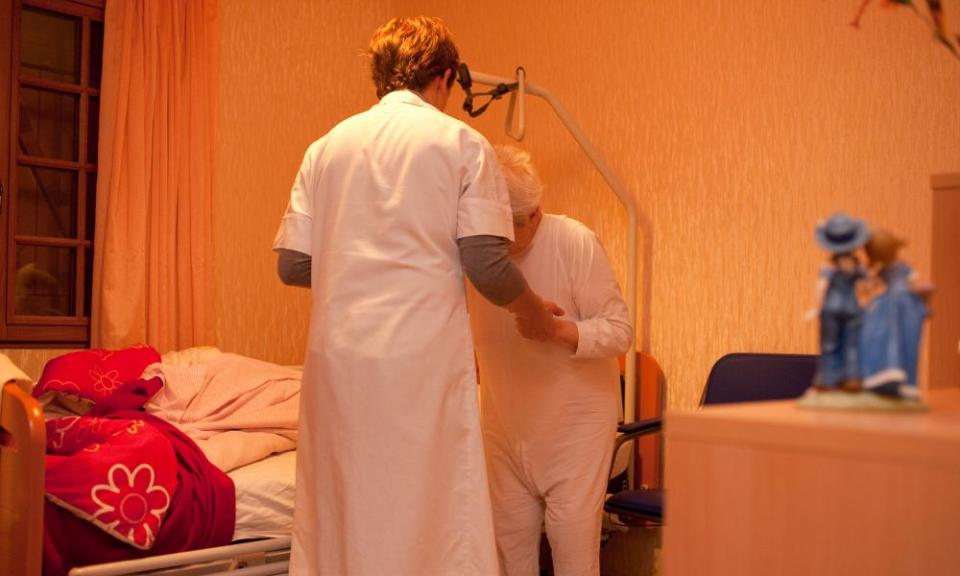All the horror stories I came across as a care worker were about employers | James Bloodworth

I spent six weeks last summer in Blackpool. I was not there for a stag do or the traditional British seaside fare, but instead to be a home care worker for a private provider.
Around 300,000 people live in residential care homes in the UK, while some 500,000 elderly and disabled people rely on home care visits for things such as washing and dressing. As the UK’s population ages, it is estimated that 1.7 million more adults will require social care over the next 15 years. The private sector employs over two-thirds of all adult social care workers.
I got the job as research for a book I am writing on Britain’s low-pay economy. Getting in was extraordinarily easy: you simply phoned a number on a job ad, and the company invited you in for a few rudimentary questions. Do you have a car? Do you live in the area? And as long as you did not say anything stupid you were offered work.
It was easy to get in because few typically stick around in jobs like this. The turnover rate in social care is 25%, compared to a UK average for all jobs of 15%. That figure is higher in the private care sector and among home care workers, where around 300,000 staff leave their jobs every year.
On my first day of work I was handed a zero-hours contract to sign and told that I would be paid the national minimum wage of £7.20 an hour. About a third of care workers are on zero-hours contracts, while some local authorities are paying out significantly less than the minimum £554 a week recommended for residential care of older people.
After just four days of basic training I was sent out to work alongside another care worker. The work itself involved everything from changing incontinence pads and stoma bags to administering medicines and cleaning up some fairly stomach-churning mess. I would usually meet a colleague at around 7am or 8am; we would visit service users for 30-minute windows until around 2pm when we would break for lunch; we would then go back on duty at 4pm and we would finish at around 10.30pm. You would usually be in bed by midnight and up again at 6am to shower, wolf down some breakfast and do it all again.
The official guidance of the National Institute for Health and Care Excellence states that a typical home care visit should last at least 30 minutes. In theory each of my visits was pencilled in for 30 minutes; however that half hour included travelling by car to and from the service user’s home, meaning that on most visits you were typically with someone for just 15 minutes. Some companies tried to do things quicker still: more than half a million (593,000) care visits between 2010 and 2013 lasted five minutes or less. You were often the only person many service users saw all day, and you would see the look of disappointment etched on their faces as you rushed out of their home after the perfunctory five minutes of small talk.
If any of my visits took longer than 20 minutes it would invariably mess up my schedule and leave another service user waiting. A traffic snarl-up on the way to a service user’s home meant working unpaid in my own time. One care worker I spoke to calculated they were getting paid just £4.30 an hour by another of the private care providers because of all the unpaid time spent going from house to house.
An often overlooked aspect of zero-hours contracts is the power it gives employers to sideline troublesome staff. Some of the care workers I spoke to cited instances of their hours being cut after they had complained about the size of their workload. I heard other stories that were more troubling still: I was told by one care worker from another company that “if you try to fill out an incident or accident form … they push you out [or] they send you on all the worst cases so you get fed up and leave”.
The social care horror stories you read about in the media typically feature rogue care workers cruelly mistreating service users. In contrast, all the care workers I worked with or spoke to were doing their very best under extraordinary pressure. “The job itself, when you leave someone feeling comfortable and clean and human again, is so rewarding,” a care worker based in Scotland told me proudly.
The funding crisis in social care has finally started to make the headlines. But in Blackpool I saw first-hand the effect that poor employment practices are having on the level of service delivered to vulnerable people. Social care will improve when the government sets aside more money for it. But shoddy levels of care will surely persist while a growing army of care workers are treated as little more than glorified cleaners by their employers.

 Yahoo News
Yahoo News 